Rutgers University is the eighth-oldest college in the United States, and one of only nine to be founded before the American Revolution. Located on the banks of the Raritan River in New Brunswick, NJ, it famously hosted the first intercollegiate football game ever played in 1869. Since its establishment, the Old Queen’s campus (as it’s historically known) has grown into a sprawling landscape peppered with nineteenth and twentieth century buildings. Great for history buffs; not so great for energy efficiency. That’s why Rutgers is embarking on a journey to transform the campus.
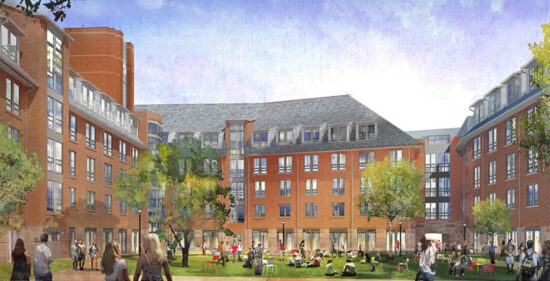
The College Avenue Redevelopment Initiative, created by Rutgers University in partnership with New Brunswick Development Corporation (DEVCO), a non-profit urban real estate development organization, is set to transform almost ten acres of the university grounds. The Initiative encompasses two distinct locations for three new buildings, which include a new academic building and two new residential environments. The new Rutgers Academic Building for the School of Arts & Sciences will provide new classrooms, generous lecture halls, ancillary academic services, and faculty offices. The five-story Honors College Residence Hall will house 540 students as well as have seminar spaces and offices for the Honors College Dean and administrative faculty. The University Apartments will house 500 upperclassmen and will feature a tower and a generous courtyard.
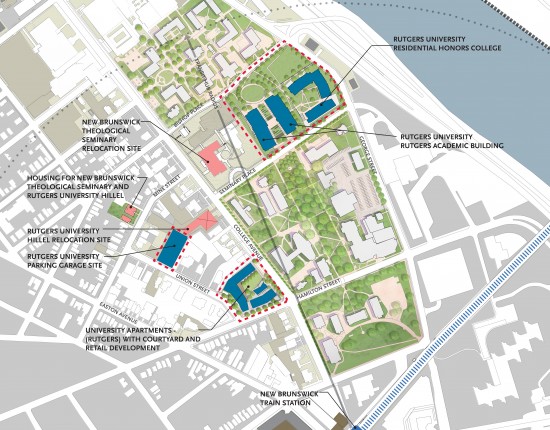
The first piece of this expansive project was catalyzed in part by the actions of the New Brunswick Theological Seminary, a participating organization of the Rutgers community for over 200 years. In the heart of the New Brunswick campus, the seminary recently sold five acres of its own site, paving the way for the redevelopment of that land. The grounds are bordered by College Avenue and George Street between Seminary Place and Bishop Place.
The other significant portion of land being redeveloped is a parking lot at the corner of Easton Avenue and Hamilton Street, also well-known as the site of the “Grease Trucks.” The beloved food trucks are being relocated indoors to make space for the redevelopment project. (So don’t worry, you still have time to try one of their famous fat sandwiches!)
The College Avenue Redevelopment Initiative has received a tax credit from the NJ Economic Development Authority’s Urban Transit Hub Tax Credit Program. As a condition for receiving this tax credit, all buildings in the Initiative must either qualify for the New Jersey Pay For Performance Program, which mandates buildings be at least 15% more energy efficient than building code, or meet Leadership in Energy and Environmental Design (LEED) Silver-level certification requirements.
In an effort to provide the Rutgers community with a sustainable future for years to come, Rutgers and DEVCO decided last year to go above and beyond by pursuing both the Pay for Performance Program and LEED Silver-level certification. Playing a critical role in the attempt to meet such ambitious energy and environmental performance goals is Boston-based architecture firm Elkus Manfredi, which is leading the design of all buildings in the initiative. Also aiding in this effort is The Green Engineer, Inc., a sustainable design consulting firm based in Concord, Massachusetts, and ReVireo, an interdisciplinary green building services company headquartered in North Brunswick, New Jersey. The Green Engineer is performing energy modeling and energy efficiency consulting for all buildings, while ReVireo is managing the LEED certification process. Matthew Kaplan, CEO of ReVireo and a LEED Accredited Professional, notes in reference to the College Avenue Redevelopment Initiative, “It’s an exciting time to be a member of the Rutgers community. By investing in sustainability and environmental preservation, DEVCO and Rutgers are constructing a future that is built to last.”
The description of each building in the Initiative is as follows:
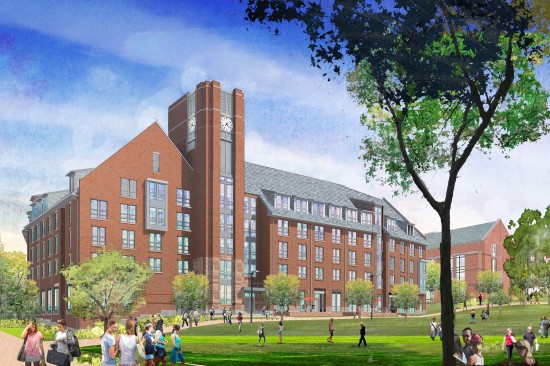
The Honors College construction began in October 2013, and is scheduled to be completed by Summer 2015. Located between Seminary Place and Bishop Place, it is a mixed-use residence hall for Honors College undergraduates from throughout the New Brunswick/Piscataway Campus. The building will be U-shaped and consist of three wings: a South Wing, an East Wing and a North Wing. Both the East Wing and North Wing will be five-story buildings while the South Wing will be a six-story building with an additional lower level as a partial basement.
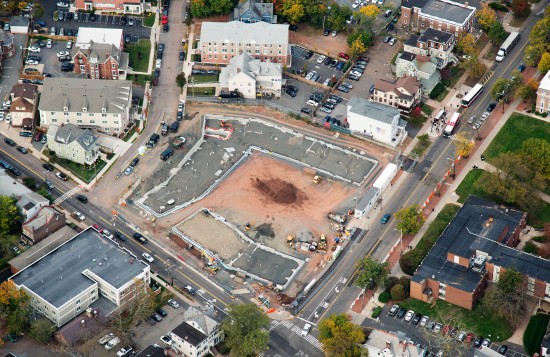
The University Apartments will begin construction in Winter 2014 and will carry on until the projected completion in Summer 2016. Located at the corner of Easton Avenue and Hamilton Street, the “apartment style” residence hall for college undergraduates from throughout the New Brunswick/Piscataway Campus will also include a retail space, underground parking and a central courtyard. The building will consist of a 14-story North Tower, a 6-story South Tower and a 4-story connector between the North and South Towers.
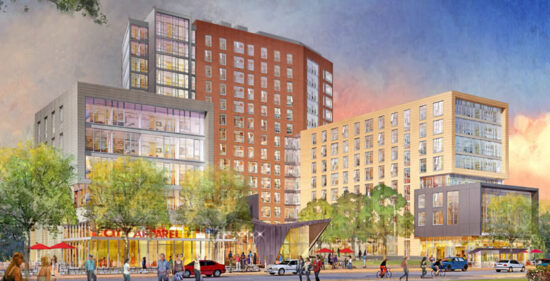
The start of construction for the Academic Building will commence in Summer 2015 and should be completed by Summer 2016. Located on the Seminary property between Seminary Place and Bishop Place, the building will be a state-of-the-art academic facility that will house classrooms, offices, and multimedia learning spaces.
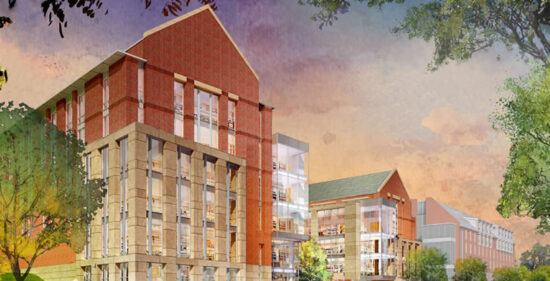
The sustainable and green building features to be included in the redevelopment initiative are described below:
Sustainable Site Planning
All three of the building sites will avoid environmentally sensitive lands. The sites also channel development into areas with existing infrastructure, protecting and preserving land that provides habitats and contains natural resources. The sites have been designed to reduce pollution and land development impacts from automobile use by making the sites as pedestrian friendly as possible.
Safeguarding Water and Water Efficiency
All toilets and faucets will be low-flow fixtures to increase water efficiency, which will reduce the burden on the municipal water supply and wastewater systems. These buildings will be designed to consume at least 20% less water than a typical building of comparable size and program would. The landscaped areas will be designed to minimize irrigation, and areas that will be irrigated will use smart irrigation technology.
Energy Efficiency and Renewable Energy
The project teams will conduct a comprehensive review of all design development building plans and determine what energy efficiency improvements can be made to the design. Energy modeling will then be performed in accordance with the requirements of both LEED and the Pay for Performance program. Through the use of the energy conservation strategies listed below, these buildings will be designed to reduce energy costs by at least 15% compared to buildings built to the minimum requirements.
- Improved building envelope construction (roof, wall, etc.)
- Improved window performance
- Optimized interior lighting
- Reduced plug loads (ENERGY STAR equipment)
- High efficiency HVAC units
- Low flow fixtures in toilets and kitchen
- High efficiency heat recovery systems on outdoor air intakes
- Reduced exterior lighting
All refrigerants used in mechanical equipment will contain zero chlorofluorocarbons (CFC’s). The lighting and HVAC systems for all buildings will be commissioned to verify that the systems are installed, calibrated and perform as intended per the design. Benefits of commissioning include reduced energy use, lower operating costs, and improved occupant productivity.
Conservation of Materials and Resources
All three buildings will divert at least 75% of construction and demolition debris from disposal in landfills and incineration facilities. In doing this, the projects will redirect recyclable resources back into the manufacturing process and direct reusable materials to other project sites. The project teams will attempt to use as many recycled building materials and local materials as possible.
Indoor Environmental Quality
Project teams have created an indoor air quality (IAQ) management plan, which includes such measures as scheduling, source control, and HVAC protection. A flush-out of the School of Arts of Sciences Academic building will be conducted once construction is completed in order to reduce indoor air quality (IAQ) problems resulting from construction and promote the comfort and well being of construction workers and building occupants. All paints, coatings, adhesives, sealants, flooring systems and composite wood products will be low-VOC emitting. To further improve the occupants’ experience in the Honors College and University Apartment buildings, the project teams will provide a range of lighting and thermal controls for both individual spaces and multi-occupant spaces (e.g., classrooms and conference areas) to promote a productive environment.
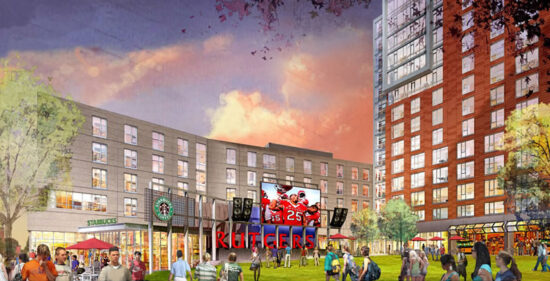
The Initiative to redevelop the College Avenue campus will provide a myriad of benefits for the New Brunswick and pedagogical community. Among these will be the creation of 1200 construction jobs and 5700 indirect jobs that will boost the local economy. The creation of additional student housing units means that local residents will be able to reclaim the New Brunswick housing that is typically rented by the students. Modernization of infrastructure will provide better utility service and connections, easier transport options for pedestrians and bus facilities, and accessibility for those with disabilities. The growth of public interactive space and the increase in green space will boost health, wellness, community, and productivity. Lastly, the Initiative will foster education about the benefits of environmentally responsible building practices, as well as greater comfort and safety for the members of the university community. The College Avenue Redevelopment Initiative will set the stage for the next 250 years of history on the venerable Old Queen’s campus.


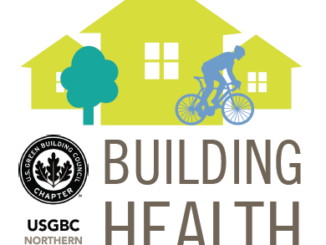
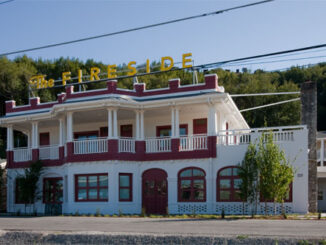
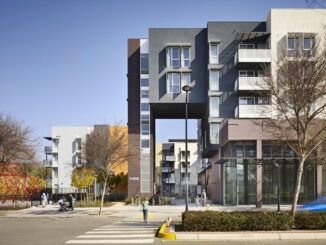
ReVireo is the best!